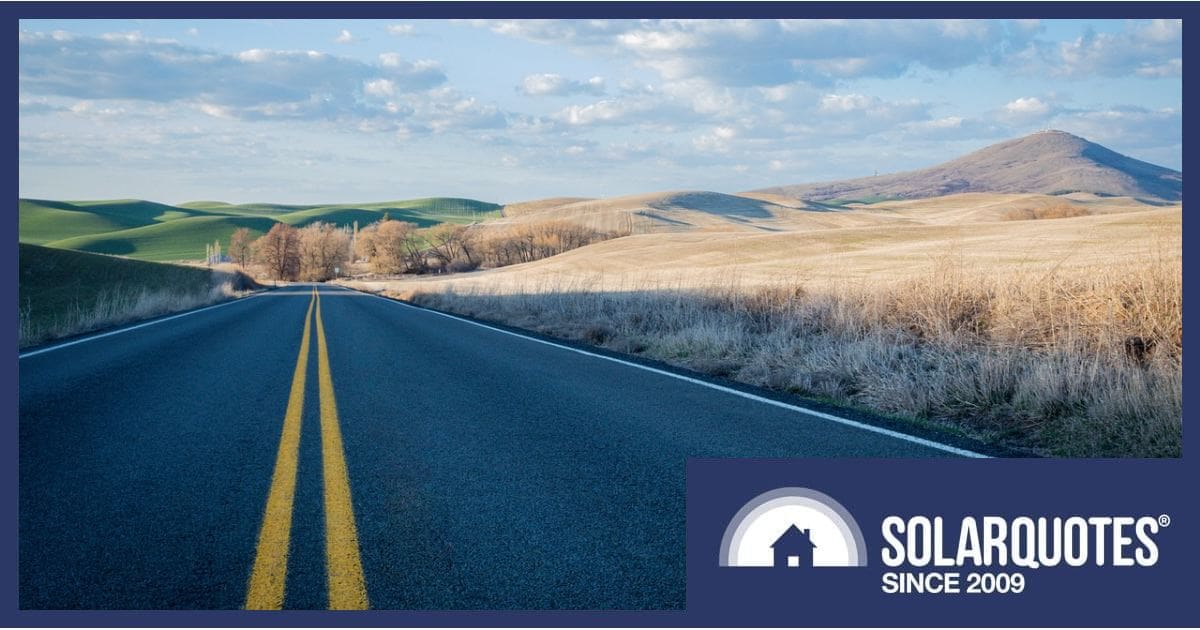
Whether on the roof of a caravan or towed in a trailer, a tragedy involving a solar panel serves as a grim reminder about ensuring PV modules are properly stowed or attached.
With a large surface area, solar panels are effectively heavy kites with sharp corners.
On the evening of December 8, 2024, a 49-year-old Canberra man was driving east along Burley Griffin Way at Galong near Yass when an item reportedly came loose from a passing caravan, smashing the windscreen and striking him in the head. While not mentioned in the original report, the item was a solar panel. Sadly, he died before emergency services arrived.
This week, a 32-year-old male driver from Church Point, Sydney was charged with unsafely driving a loaded trailer causing death in relation to the matter.
“Police allege Mr Talukder was struck by a solar panel that became dislodged from a portable power station being towed in the other direction.”
Whether it was attached to a caravan or a portable power station in a trailer, that it allegedly wasn’t properly secured remains.
The driver will appear at Young Local Court in April.
Other Fatalities And Too Many Near Misses
In October 2020, three people lost their lives near Ross in Tasmania and four were hospitalised after a driver lost control while trying to avoid solar panels that had come off a caravan towed in the opposite direction.
Four deaths (at least) and multiple injuries is shocking, but it’s a small miracle more people haven’t been killed on Australian roads by wayward solar panels. Aside from these tragic fatalities, there have been multiple near misses of this nature, and just one is too many. A couple of examples:
In December 2020, a solar panel came adrift from the roof of a caravan near Eastern Creek in Western Sydney.
In March 2021, a ute towing a box trailer heading south on the Gateway Motorway at Bracken Ridge in Brisbane could have ended very badly when two solar panels in the trailer came loose and one hit a vehicle travelling behind it.
A motorist has narrowly escaped injury after solar panels came loose from a ute on the Gateway this morning. Police are appealing for the driver to come forward. https://t.co/gQit9Wf0no pic.twitter.com/DiIJQBW098
— Queensland Police (@QldPolice) March 3, 2021
More caravanners and campers are switching on to the use of solar panels on their trips instead of noisy, polluting petrol/diesel generators. That’s great, but if panels are going to be attached to a vehicle, caravan or trailer, proper fixing/securing is paramount. And as solar installers (and others) go about their business, they need to pay close attention to transporting modules safely.
Screw Or Glue Caravan Solar Panels (Or Both)?
When we’ve written about such incidents in the past and in relation to caravan solar panel safety specifically, it has often been followed by debate about which is better to affix modules – screw, glue or screw and glue. I still see panel mounts on sale via eBay and other online marketplaces that are promoted as adhesive-only.
SQ’s veteran solar installer Anthony has some thoughts on the subject:
“Some installers insist that glue is good enough, and refuse to make holes for fear of water leaks …. In such a dynamic environment, with heat, vibration, different materials and cyclonic wind speed, you must ensure the panels are mechanically fixed. Driving tek screws straight into the alloy frame (making sure you don’t hit the glass) is a perfectly good way of fitting brackets you can bolt to the roof.”
The Caravan Industry Association of Australia provided the following advice in 2020:
- Adequate strength and durability of attachment points for expected vibration and wind loading during travel.
- Mechanical fastening (in addition to any adhesives and/or sealant).
- Correct preparation of surfaces for adhesive (where required).
- Correct curing times during application of adhesive products.
By the way, Anthony’s advice is part of a guide he put together just over a year ago on how to safely add solar power to a caravan, RV or camper. It’s really important information. While solar done right is quite safe, it can disastrous done wrong even where small systems are involved. This goes beyond panel fixing risks as issues such as bad wiring can damage gear or start a fire. And in a small enclosed space such as a caravan, things can go very pear-shaped, very quickly.

 RSS - Posts
RSS - Posts



Given the increasing number of such incidents, it’s probably time to start looking to the makers of the caravans (and the panels) getting together and working out a standardised and SAFE way of mounting panels. The numbers of panels “on the road” is only going to go up, and I suppose that having integral mounting points would be a good sales point for caravan manufacturers.